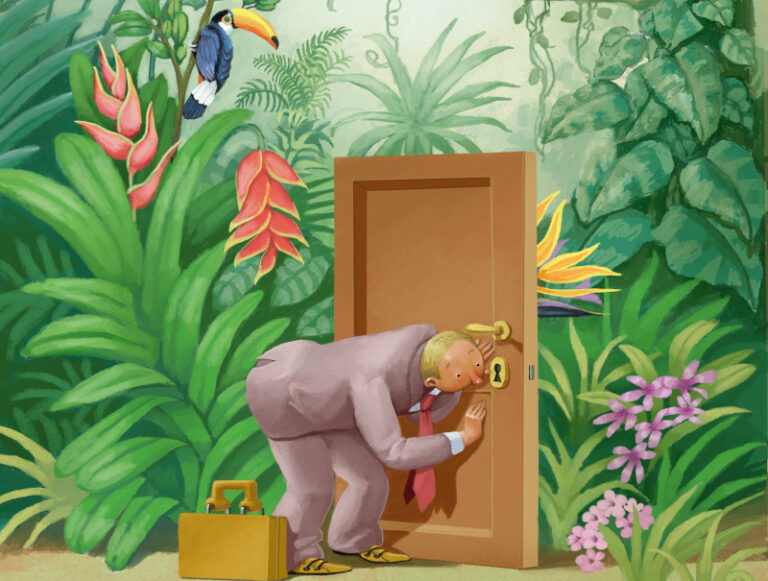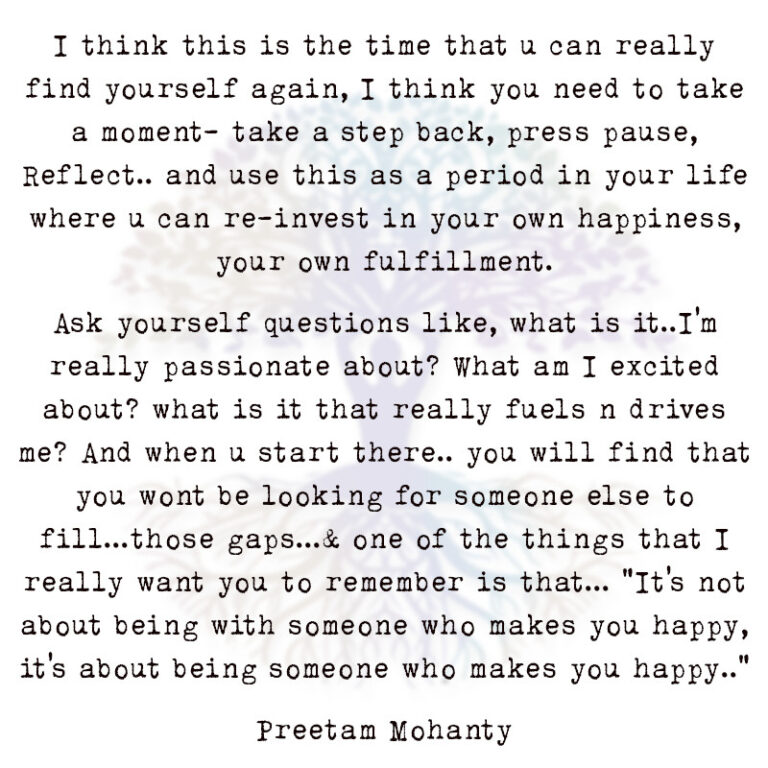“Anything that annoys you is for teaching you patience. Anyone who abandons you is for teaching you how to stand up on your own two feet. Anything that angers you is for teaching you forgiveness and compassion. Anything that has power over you is for teaching you how to take your power back. Anything you hate is for teaching you unconditional love. Anything you fear is for teaching you courage to overcome your fear. Anything you can’t control is for teaching you how to let go and trust the Universe”
~ Jackson Kiddard
Anything that Annoys you is for Teaching you Patience
5 Signs You Are Spiritually Bypassing
Often times, we use spiritual discipline to avoid actually getting in touch with our feelings. We overemphasize the positive and avoid the negative, and do not find our balance with shadow work. We believe everything that happens to us is meant to serve a bigger purpose, and some of us are overly compassionate.
What is spiritual bypassing?
“Spiritual bypassing separates us from our humanity and all its messiness and struggles and pain and It makes us feel good briefly.”
~ Karl Forehand
Often described as spiritual narcissism, spiritual bypassing is the practice of trying to find a way to feel better by ignoring our negative feelings. It is a way to cover up problems, avoid confrontation, and avoid the real world. While this is a coping mechanism, it is also dangerous.
The term “spiritual bypass” was first coined by John Welwood in 1984. It was inspired by his experience with a woman who read a lot of spiritual books, did Transcendental Meditation and was raised by a narcissistic mother. Spiritual bypassing can also be blind obedience to a spiritual guru. Even though those who spiritually bypass have a strong spiritual practice, they do not embody the lessons that come along with it.
They instead believe that they are superior to others and that they can avoid negative feelings by relying on the spiritual world. Spiritual bypassing can be seen in the form of exaggerated detachment, blind compassion, delusions of a higher level of being, and overly positive beliefs.
People who spiritually bypass may also have strong religious beliefs, and may attend fellowships, spiritual workshops, and meditation. But they haven’t yet found balance by confronting their inner demons.
Here are some signs that you are spiritually bypassing
You overemphasize the positive and avoid the negative
Using spirituality as a bypass is an attempt to ignore the reality of your life. In the world of spiritual bypassing, people become overly optimistic and avoid facing the harsh realities of life. People with emotional trauma are the ones who are highly likely to fall into this trap.
Spiritual bypassing uses spiritual practices to avoid dealing with emotional issues. Some examples of spiritual bypassing include being overly tolerant and compassionate even when it hurts you. Debilitating judgment about negativity, and putting up weak boundaries. It is also important to understand that spiritual bypassing is a defense mechanism.
If you are spiritually bypassing, you probably suffer from low self-esteem, emotional dissociation, and anxiety attacks. You will also have a hard time coping with stress, and you feel like you are the victim of your problems. It can also lead to co-dependency, which is when you have unhealthy relationships with other people.
The best way to avoid overemphasizing is to find your balance, realise that one needs to acknowledge the negative as well as positive to grow spiritually.
You have feelings of entitlement
Having feelings of entitlement is something that can be dangerous on the spiritual journey. For example, if you’re a “vegan” and you think that you’re better off than another person who doesn’t have the same diet as you because you’re uber conscious, it’s spiritual bypassing.
Just because you do yoga and you have a fab body, or your chakras are aligned doesn’t make you a better person, but when you are kind is when you’re truly aligned. It’s ok to feel entitled if you also have equal amount of humility.
However, feeling entitled can also be a sign that you have an overly idealistic ego. In addition, spiritual bypassing can lead to control issues, and even spiritual narcissism. Many people have difficulty finding their true selves as they get attached to a dysfunctional identity based on the avoidance of unresolved psychological issues.
People turn to spirituality when they are feeling depressed or distressed. This is because it is supposed to be a vehicle for growth and change. It is also a way to provide a sense of hope and meaning. In addition, spirituality can also be a very beneficial coping mechanism.
Spiritual bypassing here tends to make people shift the blame onto others.
You believe that everything happens for a reason
Whether or not you believe in God, the universe, or energy, everyone benefits from the belief that one’s misfortune is part of a grand plan. It can help keep you motivated to accomplish your goals, and maybe that’s ok. But if this is an excuse you use to let things unfold without you actively doing anything about it, then it becomes another form of spiritual bypassing.
Using any of these terms divine/God/universe to ignore or escape the difficult experiences or feelings life puts you through is a sure sign you’re a spiritual bypasser.
You don’t do your shadow work
Identifying and accepting your shadow is important for self-growth and self-awareness. Shadow work is a psychological process that uses the unconscious mind to understand what is holding you back and how you are affected by your thoughts and feelings.
Shadow work is a catalyst for change as it helps you gain self-awareness and become more compassionate. It can also increase your sense of self-respect and improve your relationships. Although shadow work can be very challenging and it requires compassion for yourself and patience.
You have to be willing to look at your innermost emotions. It is also important to understand that the process may not happen overnight. You can do some shadow work exercises on your own or with a therapist.
When you first start to identify your shadow, you will have to be willing to lean into your negative emotions. You may be uncomfortable with these feelings, but they will help you uncover and understand why you react in certain ways and help you stop spiritually bypassing.
You are overly compassionate.
Taking a spiritual approach is a way of making the bumpy ride less bumpy. A person who is good at spiritual bypassing may be calm, compassionate, and gentle. He or she may also have chronic illnesses and instead of self-care shows more concern about you. Usually, people who are good at spiritual bypassing are peacemakers and help others.
Spiritual bypassing can be caused by a good principle or practice that is applied at the wrong time or in the wrong context. It can also be caused by suppression, which creates an imbalance within, and often people who are good at spiritual bypassing do not recognize that their behaviour may hurt others.
How to stop spiritually bypassing?
It’s easier to justify living inauthentically than it is to admit something is wrong and begin working on the self. If you’re feeling frustrated or overwhelmed with your situation it’s a good idea to talk with someone you trust about your feelings.
As a member you can open up and seek support during our healing circles or even speak with a trusted friend. It’s important to accept your weaknesses, and that’s the first step to begin healing.
“In short: all the woo is keeping us from dealing with our poo. Instead of medicating with Marlboros and martinis, we might be doing it with metaphysics and macrobiotics. And unlike boozing it up to drown our pain, the side effects of neurotic psychoanalyzing or forced flexibility are difficult to spot. We don’t end up in rehab from too much meditation or therapy — we just end up in more workshops. Think of that friend you have who has a not-so-loving relationship with her body, but because she eats “health foods” and talks a good “body positive” talk about just wanting to be strong, we cheer her on. But really, she’s got self-destructive motivations and a mild eating disorder disguised as a holistic wellness routine. On the surface, positivity and wellness goalkeeping present so nicely that it can be hard to see when healthy actions are hooked to unhealthy ambitions. Like too much of anything, spiritual bypassing can numb us out from our Truth — which is where the healing answers wait to be found.”
~ Danielle LaPorte
Image Source
The Benefits of Being a Curious Adult
“I have no special gift. I am only passionately curious.” ~ Albert Einstein
Einstein’s words are ingrained with a powerful truth. Everybody is born curious, but along the way we lose that ability to stay curious and simply go about doing our mundane activities. Children have this insatiable thirst for finding out more about the world, their surroundings, because for small children that is the way they learn more about themselves. They have this innate ability to look at everything with new eyes, until their programming takes over.
“Why is it like that, How does this work, What will this do,” we are asked multiple questions during the day by our 6-year-old son. He opens up his cars, his toys to see what is inside it, how is it made and how does it function, probing us on the how and why of things.
That is the steppingstone to gaining higher level of awareness, a precursor to higher knowledge, learning and achievement. Curiosity is the source of everything.
However, curiosity gets a bad rap, society looks to suppress that curiosity because it ‘only’ functions on order. Imagine if people all around us were as curious as Eve? What would have happened? Imagine if people were curious to explore new ways of healing themselves?
“Our oldest stories about curiosity are warnings: Adam and Eve and the apple of knowledge, Icarus and the sun, Pandora’s box. Early Christian theologians railed against curiosity: Saint Augustine claimed that “God fashioned hell for the inquisitive.” Even humanist philosopher Erasmus suggested that curiosity was greed by a different name. For most of Western history, it has been regarded as at best a distraction, at worst a poison, corrosive to the soul and to society.” ~ Ian Leslie, Curious
This society will collapse if everybody were curious to know about the world they live in, if they were curious to ask the right questions. There are different kinds of curiosity to delve deeper into the subject –
Types of Curiosity
Diversive curiosity
Curiosity starts with the itch to explore. Babies are a classic example of exploration. Putting things in their mouth, trying to reach out to new things, the urge to touch everything they see, this is their way of exploring their world, by tasting it, by touching it – through their senses.
This attraction to everything novel is what is known as ‘diversive curiosity’. It encourages us to see things with new eyes, to seek out new experiences, meet new people.
In adults, the urge to check the new Insta reel, move from one tweet to the next, one video to the next feeds this diverse curiosity. But unless it is allowed to mature, transformed into something deeper and meaningful, it is futile and a waste of energy.
Epistemic Curiosity
When diversive curiosity is channelised properly, in a more disciplined way, it becomes epistemic curiosity. It goes deeper into a subject to an extent that it becomes soul-satisfying.
As Ian Leslie says, “Epistemic curiosity is hard work; it involves sustained cognitive effort. That makes it tougher, but ultimately more rewarding. Just as the resistance offered by a tungsten filament to electrons generates light in a lightbulb, it’s the very difficulty of exercising epistemic curiosity that brings illumination.
Diversive curiosity makes us want to know what lies on the other side of the mountain; epistemic curiosity arms us with the knowledge we need to survive when we get there.”
Empathic curiosity
Empathic curiosity is being curious about thoughts and feelings of others. When you step into the shoes of another person and try to see things from their perspective, it shows empathic curiosity.
It is diversive curiosity that takes us deeper into the ocean of knowledge, curiosity can fizzle out if it’s not channelised and nurtured appropriately.
Here are some best strategies for breaking out of that rut by cultivating different ways of staying curious that will ensure our survival in an increasingly complex world.
“Curiosity is a muscle — use it or lose it. It’s something that we consciously have to nurture in ourselves, in our families, in classrooms, at work.”
Stay hungry, stay foolish
Steve Jobs is a classic example of following his curiosity and intuition that helped him to make bigger strides in his life. The rest is history.
In his Commencement address delivered to Stanford University graduates, Jobs emphasised the need to ‘stay hungry, stay foolish’, get out of your comfort zone, keep learning new things, explore new ideas, and never stop learning. Basically, never let your curiosity fade away, keep moving, keep flowing!
Ask why
We accept automatic answers, without asking why does a particular thing happen this way. The society and culture doesn’t support and encourage questions. When our 6-year old son continues asking questions, it’s not about giving him ready-made answers, or ‘this is the way it is supposed to be’ kind answers, but give him open-ended answers that will further fuel his curiosity and not allowed to atrophy.
Ask questions, sometimes without seeking for answers, but with the intention of exercising that curiosity muscle.
“Childhood curiosity is a collaboration between child and adult. The surest way to kill it is to leave it alone. Epistemic curiosity is not a “natural” state of mind requiring only the removal of obstacles to flourish, but a joint project that needs to be worked at.”
When was the last time you did something for the first time?
This one is a classic question and every time I think of it, it takes me back to questioning myself. On most days, we function out of auto mode, our subconscious mind. When you sit and pause and ponder over this question, you might realise that it has been a while since you did anything for the first time.
What are we waiting for? Do something that you have never done before. It can be cooking something new, go for a run, play a sport, record a video. This builds curiosity because doing something for the first time makes you curious to know the outcome, the feelings it brings up, the experience it gives you and so on. Isn’t that exciting?
Create for the sake of creating
“You don’t really have to have knowledge — what you have to have is curiosity.” ~ Maira Kalman
To create helps you to deal with your own fallacies. Write down about what delights you. You may not be Picasso or Mozart, but you are not required to be one. Simply create to create. Make something to remind yourself that you’re still alive. Make things to inspire others to do the same. Make something to learn more about yourself. Make something just for the heck of it and see how it makes you feel.
Get bored
Allow yourself to be bored. Throughout life, there are situations where you are forced to do things or tasks that are extremely dull, boring or uninteresting.
In such a scenario, you need a bait – either it’s money at the completion of the task, or as a child you get an ice cream or a treat if you finish your homework, and so on. It’s the reward you are working for. What if you find ways to change this mundane activity into something that stimulates our curiosity, and once that happens, we’re more likely to spend time on it.
Honestly, cooking is something I am not very fond of, so the whole act of waking up in the morning to cook and pack food for my elder son can be boring and challenging. In order to make this mundane routine interesting, I often, search for recipes and try out something new, something different to eat which in turn feeds my curiosity and also makes this whole process more bearable.
Like Andy Warhol, the American visual artist, said, “I like boring things.” Warhol was known to transform the most boring object, like a can of soup – and made millions of people see it anew.
Another beautiful example is of a child brought up in slums with very little to no toys to play with will use the most ordinary object like a tin and make it into a playful drum that he enjoys and cherishes. It was the curiosity of the child that fuelled his imagination.
Replace fear of the unknown with curiosity
The video above is an amazing watch that complements the article perfectly, I hope you enjoyed it and have the power to move beyond your fear!
“The greatest virtue of man is perhaps curiosity.” ~ Anatole France
Don’t allow your life to become dull and lose its spark. Curiosity keeps the inner spark alive, feed it with fodder and nurture it with wonder, curiosity will be your antidote to happiness.
Image Source
Accepting the Complex Father-Son Relationship
“Every father should remember that one day his son will follow his example instead of his advice.”
~ Charles F. Kettering
One of the toughest relationships I have had was with my father, till date I can say that I do not have a free flowing relationship with him. But what I now realise is that most boys growing up have had odd relationships with their fathers.
Recently we’re trying to incorporate a new habit, listening to audiobooks while driving, this helped us prep for the last member listening circle and while listening to the book, “The love for imperfect things” by Haemin Sunim. Half way through the book I was filled emotionally as well as mentally and had to take a break.
The book, not only confirmed a lot of insights, but it triggered emotions but also helped provide an outlet for some of them. Haemin noticed that the emotional relationships with fathers seem to be more complicated when compared to mothers and this is more evident in father-son relationships.
Don't let this stop you, show us some love and subscribe to continue reading!
If you're already a member, please login.
Image Source
I Think This is the Time
I think this is the time that u can really find yourself again, I think you need to take a moment- take a step back, press pause, Reflect.. and use this as a period in your life where u can re-invest in your own happiness, your own fulfillment.
Ask yourself questions like, what is it..I’m really passionate about? What am I excited about? what is it that really fuels n drives me? And when u start there.. you will find that you wont be looking for someone else to fill…those gaps…& one of the things that I really want you to remember is that… “It’s not about being with someone who makes u happy, it’s about being someone who makes u happy..”
~ Preetam Mohanty




![What Is SPIRITUAL BYPASSING? [How To Stop Doing It!]](https://fractalenlightenment.com/wp-content/cache/flying-press/6cf8df7c4cb9db520dde1b07ee674d2f.jpg)






